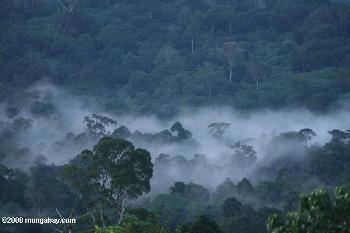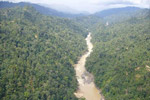In an interview with the Bruno Manser Fond, the new leader of the Malaysian state Sarawak’s People’s Justice Party (PKR), Baru Bian, spoke out against the state government’s plans for mega-dams in the middle of the rainforest, as well as continued rainforest destruction and corruption.
Baru, a lawyer by trade, stated that the indigenous communities “very existence and livelihood is being threatened” by the dozen mega-dam projects, which would flood vast areas of rainforest land.
“The state government’s plan for twelve new dams is a pretext for extinguishing native land rights in our main rivers’ watersheds in the name of a public purpose,” Baru said, adding that the nearly-completed Bakum dam was a “monument to corruption”.
Instead of building massive industrial projects, such as the dams, Baru proposes empowering rural populations to develop locally through agriculture. He advocates indigenous people having greater access to education, developing roads for native communities, and providing power through mini-hydro dams, which would have far less environmental impact.
 Mist rising in Malaysian rainforest in Borneo. Photo by: Rhett A. Butler. |
Baru is an expert at native law: his law office has long-represented native communities against the state government. He states that he would put an end to timber and plantation industries invading native lands by setting up a land commission to investigate native rights to disputed land, issuing land titles where rights are confirmed.
In addition, Baru states that the preservation of Sarawak’s remaining rainforests is essential: “[Rainforest preservation] is a global concern, and we must take it on. I look forward to proper forest management, and we must also achieve clean rivers and sustainably managed forests once again.”
Baru blames Sarawak’s problems—from a shortage of funds to a lack of indigenous rights—on corruption at the local level and a ‘colonial’ mentality from the federal level in peninsular Malaysia.
“We are living under another form of colonialism, whereby the colonial power is in West Malaysia,” he said. Although Sarawak is rich in oil and gas, the vast majority of the money from these industries goes to the federal government, leaving Sarawak one of Malaysia’s poorest states.
Baru says that he could fund numerous rural development plans by demanding Sarawak’s fair share from its oil and gas industries. Currently, the state receives only 5 percent of the royalties from its oil and gas industries.
“We are prepared to fight for the oil and gas royalties. With this money alone, we could do plenty of things for Sarawak,” Baru told the Bruno Manser Fund.
For the full interview: http://www.bmf.ch/en/news/?show=193
Related articles
The real Avatar story: indigenous people fight to save their forest homes from corporate exploitation

(12/22/2009) In James Cameron’s newest film Avatar an alien tribe on a distant planet fights to save their forest home from human invaders bent on mining the planet. The mining company has brought in ex-marines for ‘security’ and will stop at nothing, not even genocide, to secure profits for its shareholders. While Cameron’s film takes place on a planet sporting six-legged rhinos and massive flying lizards, the struggle between corporations and indigenous people is hardly science fiction.
Malaysia to allow logging in indigenous ‘peace park’ to proceed
(12/17/2009) Malaysia, the country with the fastest rate of greenhouse gas emissions growth since 1990 among middle and upper income countries, will allow logging to proceed in a contested rainforest area in Sarawak, on the island of Borneo.
Rainforest tribe sues the Malaysian government for enabling deforestation
(12/10/2009) Five Penan rainforest communities are suing the Sarawak state government and the Malaysian timber giant Samling for violation of their native customary rights, reports the Bruno Manser Fund, a group that works on behalf of indigenous groups in Malaysia.
Rainforest tribe declares ‘peace park’ to defend lands from logging in Sarawak
(11/30/2009) In an attempt to block destructive logging of their traditional land, a group of indigenous Penan has declared a “peace park” in the Upper Baram region of Sarawak in Malaysian Borneo, reports the Bruno Manser Fund.
Fifteen indigenous leaders arrested in Borneo for protesting dams that would flood their lands
(09/16/2009) After attempting to send a memorandum of protest against two dam proposals to the Sarawak Chief Minister Taib Mahmud, fifteen indigenous leaders were arrested in Kuching, Sarawak, reports the non-governmental organization the Burno Manser Fund.
Independent review finds logging company has abused rights of indigenous Penan in Borneo

(09/15/2009) An independent review of Interhill Logging found that the Sarawak logging company has regularly violated forest laws and abused the rights of the indigenous Penan peoples. The review, conducted by French tourism giant ACCOR, found that Interhill Logging had not received free, prior, and informed consent from the local Penan people for its logging operations; the logging being done by Interhill “is very definitely not sustainable”; the company is not fully compiling with Sarawak’s Natural Resources and Environment Board; and Interhill is providing no long-term benefits to the Penan peoples.
Power, profit, and pollution: dams and the uncertain future of Sarawak

(09/03/2009) Sarawak, land of mystery, legend, and remote upriver tribes. Paradise of lush rainforest and colossal bat-filled caves. Home to unique and bizarre wildlife including flying lemurs, bearcats, orang-utans and rat-eating plants. Center of heavy industry and powerhouse of Southeast Asia. Come again? This jarring image could be the future of Sarawak, a Malaysian state on the island of Borneo, should government plans for a complex of massive hydroelectric dams comes to fruition. The plan, which calls for a network of 12 hydroelectric dams to be built across Sarawak’s rainforests by 2020, is proceeding despite strong opposition from Sarawak’s citizens, environmental groups, and indigenous human rights organizations. By 2037, as many as 51 dams could be constructed.
Penan tribe to continue blockade against loggers with blowpipes and spears
(09/01/2009) A meeting between the Penan indigenous tribe, Malaysian government officials, and representatives of a logging company ended without an agreement on Friday. After the meeting, a Penan spokesman declared that the group’s blockade would continue. Blockaders, dressed in traditional garb, have armed themselves with blowguns and spears.
Forest fires set by Borneo dam developer contributes to haze in Malaysia, Singapore

(08/17/2009) The developer of a massive hydroelectric project in Borneo plans to set fire to thousands hectares of logged over rainforest in the dam area, contributing to polluting haze already blanketing the region and raising the risk of forest fires in adjacent areas, reports a local environmental group. The Sarawak Conservation Action Network has learned that Sarawak Hidro Sdn Bhd, the operator of the Bakun Hydroelectric Power Dam project, is in the process of clear-cuting 80,000 hectares (200,000 acres) of rainforest set to be flooded by the dam. The remnants are being torched, in direct violation of Malaysia’s laws against open burning.